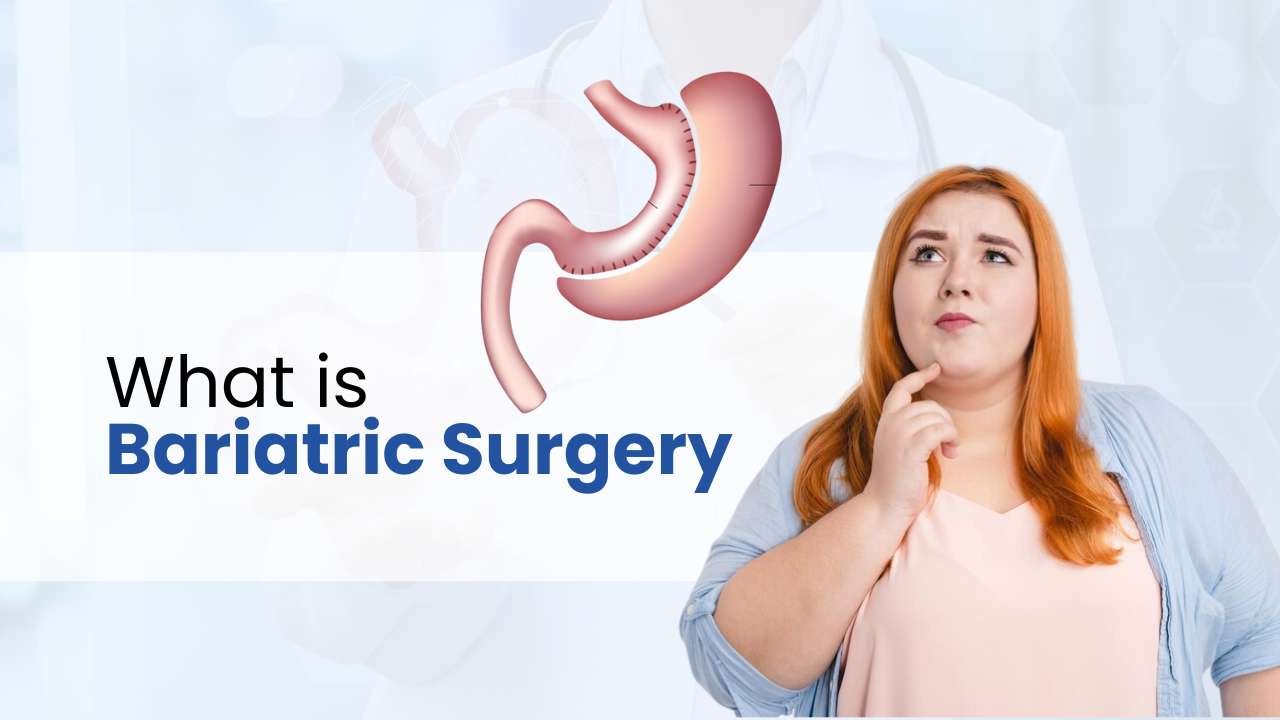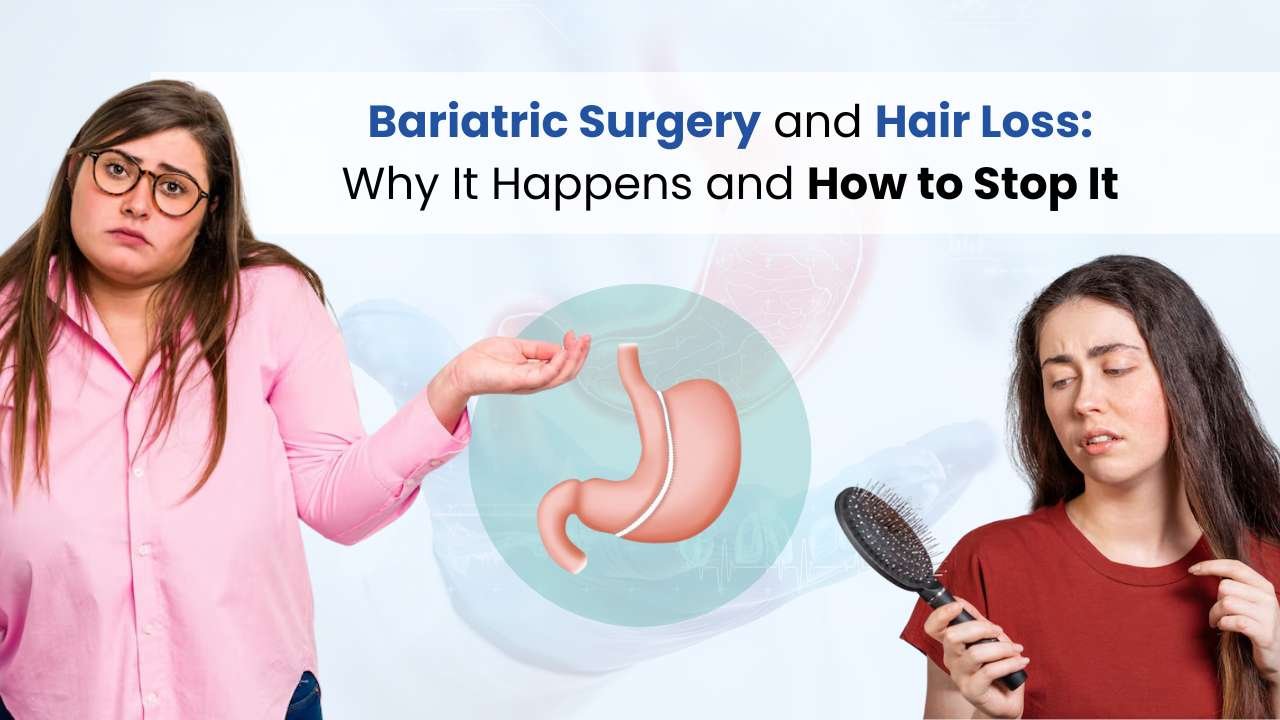Home Blogs Bariatric Surgery Bariatric Surgery and Hair Loss: Why It Happens and How to Stop It

Are you worried about your hair loss?
Does seeing thousands of hair strands in your comb scare you? Don’t worry, we are here to help you.
Overweight and obesity are becoming more and more common worldwide, and in many nations, they are becoming serious public health issues. When a patient meets the acknowledged criteria for severe, complicated obesity, metabolic and bariatric surgery (MBS) is now a recognised therapy option.
MBS is known to cause hair loss as an adverse effect. More than 50% of patients have had hair loss in the near term after MBS, according to a certain study. Others have demonstrated that iron and zinc levels are linked to hair loss. Hair loss can cause unnecessary anxiety and affect a patient's quality of life, mental health, and self-esteem, even though it usually does not result in significant morbidity.

Bariatric surgery, sometimes referred to as weight loss surgery, is a class of medical procedures designed to assist obese patients in losing weight. If you have tried alternative weight loss techniques and obesity seems to be a bigger health risk than surgery, your doctor might suggest bariatric surgery.
Your digestive tract, mostly your stomach, but occasionally your small intestine, is altered during bariatric surgery operations to control the amount of calories you can take in and absorb. They can also lessen the signals of hunger that are sent to your brain from your digestive system.

The general stress your body experiences from surgery, quick weight reduction, and inadequate protein intake can all contribute to the somewhat normal occurrence of hair loss three to five months after weight-loss surgery. Lack of essential elements in diet, including zinc, biotin, potassium, vitamin B6, or phosphorus, may be another less frequent cause of hair loss following surgery.
A lack of essential nutrients may harm the hair follicles. If your diet is low in protein, your hair will fall out as it grows through your scalp.
After surgery, hair loss can be avoided by eating a diet rich in protein, appropriate vitamins, and minerals needed for hair growth.

These are a few conditions that require Bariatric surgery:
⦿ Uncontrolled Diabetes
⦿ Uncontrolled Hypertension
⦿ High Cholesterol
⦿ Kidney failure
⦿ Heart diseases
⦿ Non alcoholic fatty liver disease
Before your bariatric surgery, your doctor will want to make sure you are psychologically and physically prepared for the procedure. You will meet with a group of experts who will assess your mental and physical health and offer you advice on the advantages and disadvantages.
Medical screening tests may be required to guarantee the procedure's safety. You must give up tobacco, drugs, and heavy alcohol use before you may have surgery.
A diet may be advised for a few weeks before your procedure. By reducing the amount of fat in your abdomen, where the treatment will be done, you can increase safety and decrease the likelihood of complications. Your surgeon is going to give you detailed instructions to adhere to.
Your doctor will see you for follow-up appointments and tests regularly throughout the first year following surgery.
To check for any nutritional deficiencies and track how your health is improving, they will perform metabolic blood tests. If you've lost a significant amount of weight and are in good health after the first year, you might wish to talk to your healthcare physician about body sculpting choices. Tightening loose tissues and eliminating extra skin folds are done for body contouring.

◾Advice on how to reduce hair loss during weight-reduction procedures
◾Get at least 60 to 80 grams of protein every day.
◾Make sure you include a protein in each meal you consume.
◾For daily protein intake targets, use powdered or liquid protein supplements.
◾Consume vitamin and mineral supplements as prescribed by your physician.
◾Every day, eat a wide range of nutritious, healthful foods.
◾Don't worry if there is hair loss from bariatric surgery, it will regrow
FAQs
‣ Consume plenty of protein. All cells, including the cells that make up your hair, are made of protein. Reduced satiety and hair thinning may result from not consuming the necessary 60g of protein daily. Make sure that every meal includes meals that are high in lean protein. Beans, protein bars, chia seeds, flax, cottage cheese and low-fat string cheese, baked or grilled salmon, skinless poultry, lean red meat, and Greek yoghurt are other examples.
‣ Consume vitamins. Consider your daily vitamins as prescription drugs because of the numerous nutrient deficits that might cause hair loss. They offer the B vitamins required to maintain healthy, luxuriant hair and are the key to preventing nutrient deficits. Start taking your chewable bariatric multiple vitamin daily two weeks before surgery to help prevent hair loss and fatigue associated with low nutritional status.
‣ Iron counts. If your hair loss persists for seven months following surgery, get your iron levels examined. The micronutrient iron is most frequently associated with hair loss. Hair loss is frequently linked to low ferritin levels, which are a sign of iron storage. If your hair loss has not halted after following tips 1-3, think about increasing the amount of zinc in your diet. Zinc is essential for normal hair growth and development.
Consult your physician or nutritionist before using a zinc supplement because excessive zinc intake might have serious side effects. In the American diet, oysters, red meat, and chicken are the primary sources of zinc. Vitamin B-6, vitamin A, folate, and essential fatty acids are other nutrients associated with good hair. Hair loss can also result from systemic conditions such as polycystic ovarian syndrome (PCOS) and thyroid problems, as well as genetics.
The general stress your body experiences from surgery, quick weight reduction, and inadequate protein intake can all contribute to the somewhat normal occurrence of hair loss three to five months after weight-loss surgery. Lack of essential elements in diet, including zinc, biotin, potassium, vitamin B6, or phosphorus, may be another less frequent cause of hair loss following surgery.
A lack of essential nutrients may harm the hair follicles. If your diet is low in protein, your hair will fall out as it grows through your scalp.
After surgery, hair loss can be avoided by eating a diet rich in protein, appropriate vitamins, and minerals needed for hair growth.
The following are some longer-term dangers and problems of gastric bypass surgery:
Following weight loss surgery requires patients to adhere to certain lifestyle rules. Patients can improve their postoperative results and preserve their health by adhering to these guidelines, which get easier to follow over time:

Written By
A hard working, patient centred, skillful and knowledgeable doctor who is always ready to learn.
From a very young age she aspired to be in the medical field, to help cure the ailing. She believes that relief on the patient's face, the smile of gratitude and the feeling of helping someone is all what matters.
SOURCE
HISTORY
At Mejocare, we prioritize accuracy and reliability. Our content is based on peer-reviewed studies, academic research, and medical associations. We avoid tertiary references. Learn more in our editorial policy. Trustworthy health information for you.
ttps://pmc.ncbi.nlm.nih.gov/articles/PMC8113177/ para 1 and 2 https://www.pennmedicine.org/updates/blogs/metabolic-and-bariatric-surgery-blog/2013/march/tips-for-minimizing-hair-loss-after-weight-loss-surgery Para 1 https://my.clevelandclinic.org/health/treatments/bariatric-surgery https://www.ecommunity.com/healthminute/2015/4-tips-prevent-hair-loss-after-bariatric-surgery
CURRENT VERSION
Our care team can help you.
